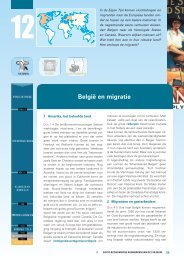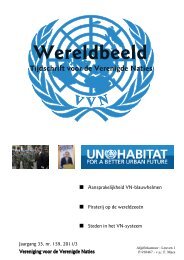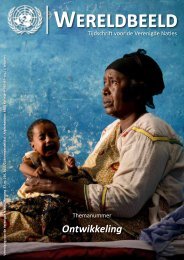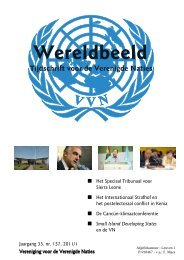Annex 5: United Nations Security Council Resolution 1874 (2009)
Annex 5: United Nations Security Council Resolution 1874 (2009)
Annex 5: United Nations Security Council Resolution 1874 (2009)
You also want an ePaper? Increase the reach of your titles
YUMPU automatically turns print PDFs into web optimized ePapers that Google loves.
A Deep International Crisis Seems Imminent<br />
What implications do the recent actions and discourse of the<br />
DPRK have for Northeast Asian security? What do they<br />
forebode for the international system?<br />
According to the Indian analyst Chari, it would be<br />
excessive to believe that North Korea presents a direct<br />
nuclear threat to South Korea or Japan, and much less to<br />
the <strong>United</strong> States. Why? It has been assessed that North<br />
Korea’s recent nuclear test was only a qualified success,<br />
and that it may not be able to miniaturize its nuclear<br />
weapons for carriage by a missile or aircraft. North<br />
Korea does not require nuclear weapons to attack South<br />
Korea or Japan, assuming that its unpredictable regime<br />
wishes to pursue this disastrous policy. Its long-range<br />
artillery and short/medium range missiles can wreak havoc on South Korea and Japan. In<br />
fact, Seoul, which houses almost one half of South Korea’s total population of some 80<br />
million, is only 40 miles south of the DMZ separating the two Koreas (Chari, <strong>2009</strong>: 6-7).<br />
According to Chari, the danger from North Korea’s nuclear and missile capabilities arise for<br />
other reasons that are more subtle and indirect (Chari, <strong>2009</strong>: 7-8):<br />
- First, they generate a permissive atmosphere, encouraging other nuclear aspirants to<br />
derive their nuclear option by clandestine means. The regional candidates are South<br />
Korea and Japan, but also Taiwan that have the capability to deploy a nuclear arsenal.<br />
They have not done so because they have sheltered under the umbrella of extended<br />
deterrence provided by the <strong>United</strong> States. Should their confidence in US ability to<br />
continue providing extended deterrence weaken, South Korea and Japan, but also<br />
Taiwan, could rethink their earlier decisions to forsake their nuclear option, despite<br />
their vociferous denials that this question will not arise under any circumstances.<br />
- Second, if North Korea deploys its nuclear arsenal, the extra-regional nuclear<br />
aspirants like Iran and Syria would feel encouraged to pursue their nuclear<br />
ambitions. Collectively, all these developments would greatly weaken the<br />
international nuclear regime that is under considerable strain already, with the next<br />
Review Conference of the Nuclear Non-Proliferation Treaty slated for next year in 2010.<br />
For its part, North Korea has never been averse to assisting other nuclear aspirants to<br />
derive their nuclear option or develop their missile capabilities.<br />
- Third, North Korea’s intransigence throws into high relief the weakness of the<br />
counter-proliferation regime. North Korea has proven that it can bargain with its<br />
neighbours and the <strong>United</strong> States by threatening to either develop and/or transfer<br />
nuclear weapons or by collapsing as a national entity. The collapse of North Korea<br />
presages large-scale refugee movements into China and South Korea; hence, they are<br />
not prepared to let it fail. South Korea, moreover, no longer wishes to reunify the<br />
Korean peninsula, fearing that the absorption of North Korea would entail huge<br />
economic costs; besides, it would inherit Pyongyang’s nuclear legacy, with all its<br />
adverse consequences; hence it is more greatly inclined now to deal with North Korea<br />
as a separate entity.<br />
© <strong>2009</strong> – Dr. D. Criekemans – Negotiations in UNSC on the continuing security provocations by North Korea 26







